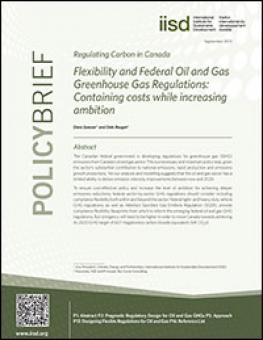
Regulating Carbon in Canada - Flexibility and Federal Oil and Gas Greenhouse Gas Regulations: Containing costs while increasing ambition
The federal government is developing regulations for greenhouse gas (GHG) emissions from Canada's oil and gas sector.
This is a necessary and important policy step given the sector's substantial contribution to national emissions, rapid production and emissions growth projections. Our analysis and modelling suggests that the oil and gas sector has a limited ability to deliver emission intensity improvements between now and 2020. To ensure cost-effective policy and increase the level of ambition for achieving deeper emissions reductions, federal sector-by-sector GHG regulations should consider including compliance flexibility both within the sector and beyond the sector. Federal light- and heavy-duty vehicle GHG regulations as well as Alberta's Specified Gas Emitter Regulations provide compliance flexibility blueprints from which to inform the emerging federal oil and gas GHG regulations. But stringency will need to be higher in order to move Canada towards achieving its 2020 GHG target of 607 megatonnes.
You might also be interested in
Powering the Clean Energy Transition: Net-Zero electricity in Canada
This brief explains how a shift to clean power generation can offer affordable, reliable electricity, benefiting households and businesses alike.
IISD Welcomes Draft Regulations for Oil and Gas Pollution Cap
A firm cap on emissions can provide certainty for industry to invest in decarbonization, while ensuring the sector is on a path to net-zero by 2050.
For Nature-Based Solutions to Be Effective, We Need to Work with Indigenous Peoples and Local Communities
Nature-based solutions have been praised as a promising approach to tackling the twin crises of climate change and biodiversity loss. But some Indigenous Peoples and local communities are questioning the legitimacy of the concept and what it symbolizes. It is time to listen to what they have to say.
How Fossil Fuels Drive Inflation and Make Life Less Affordable for Canadians
New report takes closer look at how Canada’s dependence on fossil fuels impacts energy costs and prices of essentials such as transportation, home heating, and housing.